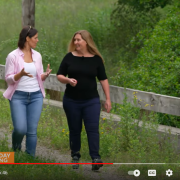NCAT Supports Bipartisan Effort to Expand AgriSolar Research
The National Center for Appropriate Technology (NCAT) applauds Senator Martin Heinrich (D-NM) and Senator Mike Braun (R-IN) for introducing a bill that will expand research for agrivoltaics, or agrisolar, which pairs appropriate farmland with solar energy production.
“Expanding agrisolar is all about maximizing our resources to grow both food and renewable energy on the same piece of land, while at the same time diversifying revenue sources for farmers,” said NCAT Executive Director Steve Thompson. “NCAT’s AgriSolar Clearinghouse has spent the last two years working with farmers, land managers, and solar companies to harvest the sun twice. This bipartisan bill will allow us to take agrivoltaics to the next level in this country.”
Agrisolar or agrivoltaic partnerships are growing across solar-appropriate farmland in the U.S., providing a new revenue source for farmers, clean energy for surrounding communities, and myriad benefits to crops, livestock, and pollinators.
The Agrivoltaics Research and Demonstration Act of 2023 will direct $15 million to the U.S. Department of Agriculture for the study of agrisolar systems to develop best practices for farmers, ranchers, solar developers, and communities who want to adopt or expand the use of agrivoltaics.
Supporters of the bill include NCAT, American Farmland Trust, the National Sustainable Agriculture Coalition, and the American Solar Grazing Association, among others.
“We applaud Senator Heinrich and Senator Braun for their forward-thinking leadership in introducing this bill,” said Tim Fink, Policy Director for American Farmland Trust. “As the essential transition toward renewable energy accelerates across the country, it must be done in a way that strengthens rural communities and minimizes the footprint on our most productive farmland. This legislation would help advance the potential for agrivoltaics to do both.”
NCAT’s AgriSolar Clearinghouse connects businesses, land managers, and researchers with trusted resources to support the growth of co-located solar and sustainable agriculture. The Clearinghouse includes an interactive atlas of agrisolar sites, funding opportunities and state-specific incentives, an information library with more than 500 peer-reviewed articles, multimedia tools like photos, podcasts, and videos, and one-on-one technical assistance for farmers and solar developers.

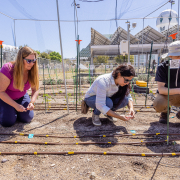
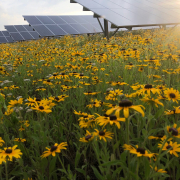
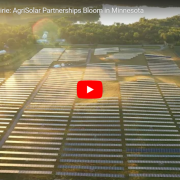
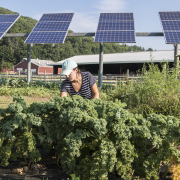 Photo by Dennis Schroeder / NREL
Photo by Dennis Schroeder / NREL